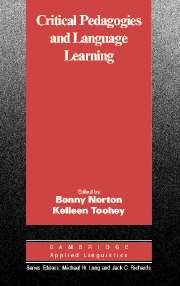Book contents
- Frontmatter
- Contents
- List of contributors
- Acknowledgments
- Chapter 1 Critical pedagogies and language learning: An introduction
- I RECONCEPTUALIZING SECOND LANGUAGE EDUCATION
- II CHALLENGING IDENTITIES
- III RESEARCHING CRITICAL PRACTICES
- Chapter 10 The logic of nonstandard teaching: A course in Cape Verdean language, culture, and history
- Chapter 11 Comic book culture and second language learners
- Chapter 12 Classroom interaction, gender, and foreign language learning
- Chapter 13 Living with inelegance in qualitative research on task-based learning
- IV EDUCATING TEACHERS FOR CHANGE
- Author Index
- Subject Index
Chapter 13 - Living with inelegance in qualitative research on task-based learning
Published online by Cambridge University Press: 05 October 2012
- Frontmatter
- Contents
- List of contributors
- Acknowledgments
- Chapter 1 Critical pedagogies and language learning: An introduction
- I RECONCEPTUALIZING SECOND LANGUAGE EDUCATION
- II CHALLENGING IDENTITIES
- III RESEARCHING CRITICAL PRACTICES
- Chapter 10 The logic of nonstandard teaching: A course in Cape Verdean language, culture, and history
- Chapter 11 Comic book culture and second language learners
- Chapter 12 Classroom interaction, gender, and foreign language learning
- Chapter 13 Living with inelegance in qualitative research on task-based learning
- IV EDUCATING TEACHERS FOR CHANGE
- Author Index
- Subject Index
Summary
Introduction
Within the field of second language acquisition (SLA), there has been some sustained theoretical and methodological discussion on the different research approaches and paradigms. One of the recurring themes of this discussion turns to the differences between, broadly speaking, quantitative and interpretative approaches. The former is often associated with a tendency to work with psychological or psycholinguistic paradigms and statistical data analyses; the latter, the main focus of our attention here, is likely to draw on, inter alia, some form of qualitative methodology or discourse analysis (for a discussion, see Davis, 1995; Kumaravadivelu, 1999). This chapter sets out to discuss some of the issues concerned with the use of interactional discourse data germane to classroom-based SLA research. First, we will provide a brief account of the context of the data gathering that generated the theoretical and research issues that we wish to discuss in this chapter and highlight some of these issues with reference to some classroom data. It is our view that working with naturally occurring data is inevitably a messy enterprise, but one that many researchers find difficult to fully acknowledge or account for in the presentation of their research data. Noteworthy exceptions are, for instance, Bloome (1994); Candela (1999); Gutierrez, Rymes, and Larson (1995); and Kamberelis (2001). After that, we will attempt to relate our concerns and observations to wider debates on the epistemologies and practices of different research traditions and perspectives.
- Type
- Chapter
- Information
- Critical Pedagogies and Language Learning , pp. 242 - 268Publisher: Cambridge University PressPrint publication year: 2004
- 15
- Cited by

